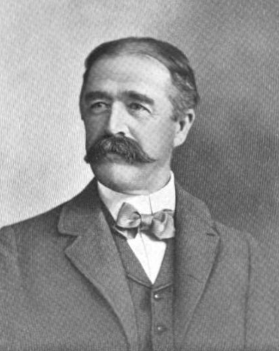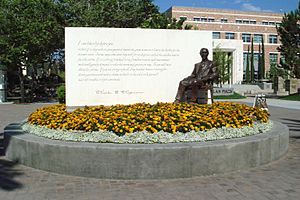Charles Chapman (mayor) facts for kids
Quick facts for kids
Charles Chapman
|
|
|---|---|
 |
|
| Mayor of Fullerton, California | |
| In office 1904–1906 |
|
| Personal details | |
| Born |
Charles Clarke Chapman
July 2, 1853 Macomb, Illinois |
| Died | April 5, 1944 (aged 90) Fullerton, California |
| Political party | Republican |
| Spouses |
Lizzie Pearson
(m. 1884; died 1894)Clara Irvin
(m. 1898) |
| Occupation | Businessman, politician |
Charles Clarke Chapman (1853–1944) was an important businessman and politician in California. He was the very first mayor of Fullerton, California. He was also a distant relative of the famous "Johnny Appleseed". Chapman moved from Illinois to Southern California. Before that, he was a publisher in Chicago.
Chapman was a big supporter of the Disciples of Christ church. He gave a lot of money and helped raise funds for California Christian College. In 1934, this college changed its name to Chapman College. Today, it is known as Chapman University, named in his honor.
Some people think Chapman Avenue, a big road in Orange County, is also named after him. However, that street is actually named after Alfred Chapman. Alfred was not related to Charles. He helped start the city of Orange.
Contents
Becoming the "Orange King"
Charles Chapman was born in Macomb, Illinois, on July 2, 1853. In 1894, he moved from the Midwest to Los Angeles. There, he bought an orange grove in Placentia just for fun. This was his first step into the citrus business.
New Ways to Grow Oranges
Chapman was very creative with how he grew oranges. He made sure his workers wore gloves. They also used special clippers with rounded tips. This helped prevent damage to the oranges' skin. Less damage meant fewer spoiled fruits. His new ideas made him very successful. People even called him the "Orange King."
Chapman worried about his oranges competing with those from Spain and Italy. In 1906, he and other growers asked the government for help. They successfully convinced the House Ways and Means Committee to add a small tax, called a tariff, on European oranges. This made foreign oranges more expensive.
Valencia Oranges: A Sweet Discovery
Chapman discovered something special about Valencia oranges. He found they could stay on the trees for six extra months after they were ripe. This meant he could ship oranges to customers during months when oranges were usually not available. This was different from the popular Washington navel oranges. At one time, Valencia oranges grown in Orange County made more money than oranges from anywhere else.
Testing Fertilizers
As his business grew, Chapman tried different types of fertilizers. He wanted to see which ones would grow the best oranges. He tested sheep manure, lime cake, bone meal, and other special plant foods. He found that these fertilizers did not make a big difference in orange quality. He believed this was because the soil already had enough nutrients. Good farming methods were more important.
Smart Ways to Sell Oranges
Chapman strongly believed that selling oranges should start right after they were picked. In the packing houses, oranges had to be cleaned and handled carefully. This was because too many oranges arrived at markets in bad condition. Chapman said that only the very best oranges should be sent to stores.
He also thought that orange brands should build a good name. They should focus on selling to specific markets. This helped build brand loyalty. He also believed in advertising oranges as tasty, healthy, and a bit fancy. Chapman made his brand popular with cool crate labels. His "Old Mission" brand oranges used pictures of Catholic monks and outdoor scenes. These images came from a famous book called Ramona.
Fullerton's First Mayor
Charles Chapman was a member of the Republican Party. He was elected as the first mayor of Fullerton, California. He served in this role from 1904 to 1906.
About Charles Chapman's Life
Chapman married Lizzie Pearson in Texas on October 23, 1884. They had two children together. Lizzie passed away in Los Angeles on September 19, 1894. Charles married again to Clara Irvin on September 3, 1898.
He died at his ranch in Fullerton on April 5, 1944.
 | Emma Amos |
 | Edward Mitchell Bannister |
 | Larry D. Alexander |
 | Ernie Barnes |


